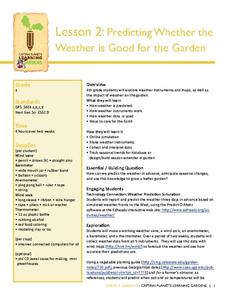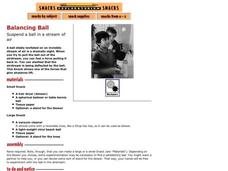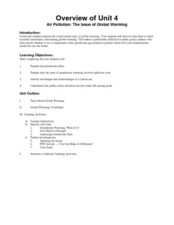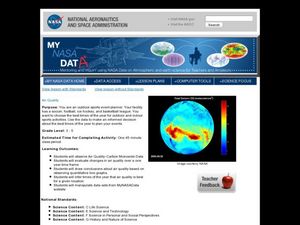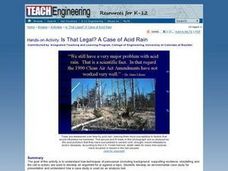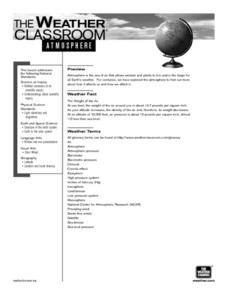Teach Engineering
Communicating Your Results
Groups analyze and interpret their data from previous research in order to develop individualized findings. The teams then use guidelines to help determine what aspects of their research to include on a poster. Class members...
Teach Engineering
Introduction to Environmental Engineering
A series on environmental engineering introduces the class to issues that environmental engineers work to solve. This first lesson plan focuses on air and land issues, and looks at ways to reduce pollution.
Captain Planet Foundation
Predicting Whether the Weather is Good for the Garden
Can your class predict the weather? Show them how they can come close with a lesson about creating weather instruments, including weather vanes, barometers, wind socks, anemometers, and thermometers. Kids research weather patterns and...
Exploratorium
Tired Weight
Take your class out to visit your automobile and use the tires to compute the weight of the vehicle. This is done by measuring the surface of the tire meeting the ground and the air pressure. This is a fun lesson in the relationship...
Exploratorium
Balancing Ball
Demonstrate lift to the class that is studying aerodynamics. In the stream of air produced by a blow dryer, little physicists place a wad of tissue paper and a spherical figure to compare. Or, if you have a vacuum cleaner and beach ball,...
Texas State Energy Conservation Office
Investigation: Blowing in the Wind
Using a simulated air sample, environmental or earth science pupils examine the components. You will need to prepare the faux air by using a hole punch and various colors of construction paper. Each color will represent a different...
Scholastic
Study Jams! Air Pressure & Wind
Blow your class away with a gust of humor as they watch this video about air pressure and wind. Along the way, they find that the density of air (as determined by temperature, altitude, and water vapor content) leads to air pressure...
Baylor College
Dust Catchers
In class, your emerging environmentalists construct dust catchers. They take them home for a week or two, and then bring them back into class to examine under a magnifier. From this activity, they learn what makes up dust and that...
Baylor College
There's Something in the Air
Clever! In order to compare indoor and outdoor dispersal rates for the movement of gases and particles through air, collaborators will participate in a classroom experiment. Set up a circular grid and set students on lines that are...
Curated OER
Air Pollution in Mexico City
A fantastic lesson plan on urban air pollution problems throughout the world is here for you. Learners understand that there are many factors involved in creating pollution, that there are many health effects brought on by air pollution,...
Curated OER
Air Pollution: The Issue of Global Warming
Here is an outstanding 10-page lesson plan on global warming. Learners discover that there is a lot of controversy surrounding this topic in that the science behind global warming is difficult to prove. The best thing about this plan is...
Curated OER
Regents High School Examination: Physical Setting Earth Science 2008
Throughout this earth science exam, high-school geologists complete a series of multiple choice and short answer questions about the solar system, atmosphere, and earth system. This is an amazing test, as are all of the exams developed...
Curated OER
Air Quality
Students observe air quality and monoxide data. In this air quality instructional activity, students draw conclusions and manipulate data from a one year period on changes in air quality.
Curated OER
What is your Air Quality?
In this air quality worksheet, young scholars use the EPA's Six Common Air Pollutants web site and the AIRNow web site to answer 9 questions about common air pollutants, how pollution affects people and the environment, how pollutants...
Curated OER
Atmospheric Pressure
Push the envelope with this lesson on atmospheric pressure! Your physics or geology juniors will be amazed at your super-human ability as you demonstrate the breaking of a stick using a newspaper! They also work with peers to construct a...
Curated OER
Barometer and Boiling Points
Diagrams bring barometers to light in this PowerPoint. Several slides explain the structure and function of this apparatus. The relationship of air pressure to the processes of evaporation and boiling are also explained. This would be an...
Curated OER
The O Zone-Code Read Alert
What are the effects of an air quality alert? Expert groups receive one component of air quality information resources to study. Pupils then jigsaw into new groups and share their knowledge. Finally, they draft a statement of what they...
Curated OER
Air Resistance and Friction
Physics learners experiment with three laboratory activities to learn about air resistance and friction. First, they use a hair dryer to move different sized spheres to determine the relationship between cross-sectional area and air...
Curated OER
Is That Legal? A Case of Acid Rain
Develop an environmental case study! Elementary learners discover how a case study is used as an analysis tool. The goal of this activity is to show pupils how techniques of persuasion (including background, supporting evidence,...
Curated OER
The Weather Classroom - Atmosphere
Meteorology learners explore the weight of air, layers of the atmosphere, and air pressure action through a series of discussions, demonstrations, and hands-on group activities. Enough discussion prompts, background information, student...
Curated OER
P.O.V.'s Borders Picture Project: Lesson 1 - Air
Take photos of human activities that impact air quality. Collaborative groups present one of the photographs, identifying how the activity contributes to air quality and what can be done to minimize the impact. As one in a series of...
Curated OER
Fighting for Control
Engage your class in a class discussion examining and defend different sides of an argument about whether the Environmental Protection Agency should have the legal authority to regulate carbon dioxide emissions. They will have to...
NASA
Behavior Over Time: Analyzing Seasonal Soil and Air Properties
Moisture can affect air temperatures and so much more! An analysis of NASA soil moisture data allows pupils to make connections between climate and weather features. They first review general data and then select a specific location to...
Bonneville
Where Does Energy Go?
Convection currents aren't just a bunch of hot air. The second of five lessons in the Solar Updraft Towers unit focuses on energy transfer and convection currents. Young scientists watch six demonstrations that illustrate how warm air...




